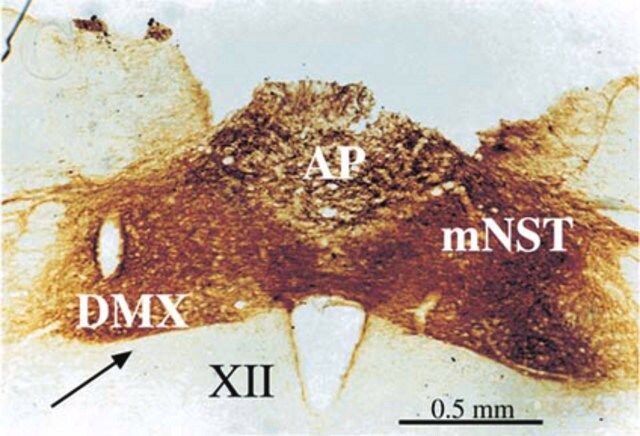您的位置:首页 > 产品中心 > Anti-Polysialic Acid-NCAM Antibody, clone 2-2B
Anti-Polysialic Acid-NCAM Antibody, clone 2-2B

产品别名
Anti-Polysialic Acid-NCAM Antibody, clone 2-2B
PSA-NCAM
基本信息
| eCl@ss | 32160702 |
| NACRES | NA.41 |
| General description【一般描述】 | Polysialic acid (PSA) is a long, linear homopolymer that is attached to the neural cell adhesion molecule (NCAM). It has the remarkable ability to down-regulate a wide variety of contact-dependent cell interactions. This activity is believed to stem from the ability of the charged polymer to occupy a large hydrated volume and thereby cause a direct physical hindrance of cell–cell contact. The regulated expression of PSA has been shown to promote a reduction in cell interactions that can create permissive conditions for changes in the structure of a variety of tissues. The broadest expression of PSA occurs on precursor cells during early development and plays a role in promotion of the migration of these cells after cell division. In most cases, PSA expression is lost after the migration process is completed. However, the axons of neurons often retain PSA to bundle,sprout, and branch appropriately during axon path-finding. |
| Specificity【特异性】 | The monoclonal works well on all species expressing PSA-NCAM including mouse. Reacts with alpha 2-8 linked neuraminic acid (NeuAc-alpha 2-8) n with n >10. This polymer is usually termed polysialic acid (PSA). In vertebrates PSA is linked to neural cell adhesion molecule (NCAM, CD56), in bacteria it is associated with capsula of meningococcus strain group B. |
| Immunogen【免疫原】 | Viable Meningococcus group B (strain 355). |
| Application【应用】 | Western Blotting: A 1:500-1:1,000 concentration of a previous lot was used in WB. Immunocyto/histochemistry: A 1:200-1:400 dilution of a previous lot of this antibody worked on live and fixed cells, tissue sections either frozen or fixed with any kind of fixative. (Rougon et al., 1986; Theodosis et al., 1991, 1999). It is not recommend that the antibody be used on paraffin embedded tissue since it gives variable results. Radioimmunoassay (RIA) : A previous lot of this antibody was used in RIA. (Figarella-Branger et al., 1996) Cell sorting and cell panning (Ben-Hur et al., 1998) Optimal working dilutions must be determined by end user. Detect Polysialic Acid-NCAM using this Anti-Polysialic Acid-NCAM Antibody, clone 2-2B validated for use in IC, IH, RIA & WB with more than 30 product citations. |
| Quality【质量】 | Routinely evaluated by Immunohistochemistry on hippocampus. Immunohistochemistry(paraffin) Analysis: PSA-NCAM (cat. # MAB5324) representative staining pattern/morphology on human hippocampus. Tissue pretreated with EDTA pH 8, antigen retrieval. Antibody was diluted to 1:100, using IHC-Select Optimal Staining With Epitope Retrieval: Alzheimer’s Hippocampus |
| Physical form【外形】 | Unpurified Mouse monoclonal IgM in buffer containing 50% glycerol, no preservatives. |
| Analysis Note【分析说明】 | Control Positive control tissue: Young Rat Hippocampus, human hippocampus. |
| Other Notes【其他说明】 | Concentration: Please refer to the Certificate of Analysis for the lot-specific concentration. |
| Legal Information【法律信息】 | CHEMICON is a registered trademark of Merck KGaA, Darmstadt, Germany |
产品性质
| Quality Level【质量水平】 | 100 |
| biological source【生物来源】 | mouse |
| antibody form【抗体形式】 | ascites fluid |
| antibody product type | primary antibodies |
| clone【克隆】 | 2-2B, monoclonal |
| species reactivity | human, rat, vertebrates, mouse |
| manufacturer/tradename | Chemicon® |
| technique(s) | immunocytochemistry: suitable immunohistochemistry: suitable radioimmunoassay: suitable western blot: suitable |
| isotype【同位素/亚型】 | IgM |
| NCBI accession no.【NCBI登记号】 | NM_000615.5 |
| UniProt accession no.【UniProt登记号】 | P13591 |
| shipped in【运输】 | dry ice |
| Gene Information | human ... NCAM1(4684) |
产品说明
| Target description【目标描述】 | 150-300 kDa |
| Storage and Stability【储存及稳定性】 | Stable for 1 year at -20ºC in undiluted aliquots from date of receipt. Handling Recommendations: Upon receipt, and prior to removing the cap, centrifuge the vial and gently mix the solution. Aliquot into microcentrifuge tubes and store at -20°C. Avoid repeated freeze/thaw cycles, which may damage IgM and affect product performance. Note: Variability in freezer temperatures below -20°C may cause glycerol containing solutions to become frozen during storage. |
| 【免责声明】 | Unless otherwise stated in our catalog or other company documentation accompanying the product(s), our products are intended for research use only and are not to be used for any other purpose, which includes but is not limited to, unauthorized commercial uses, in vitro diagnostic uses, ex vivo or in vivo therapeutic uses or any type of consumption or application to humans or animals. |
安全信息
| Storage Class Code【储存分类代码】 | 10 - Combustible liquids |
| WGK | WGK 1 |







